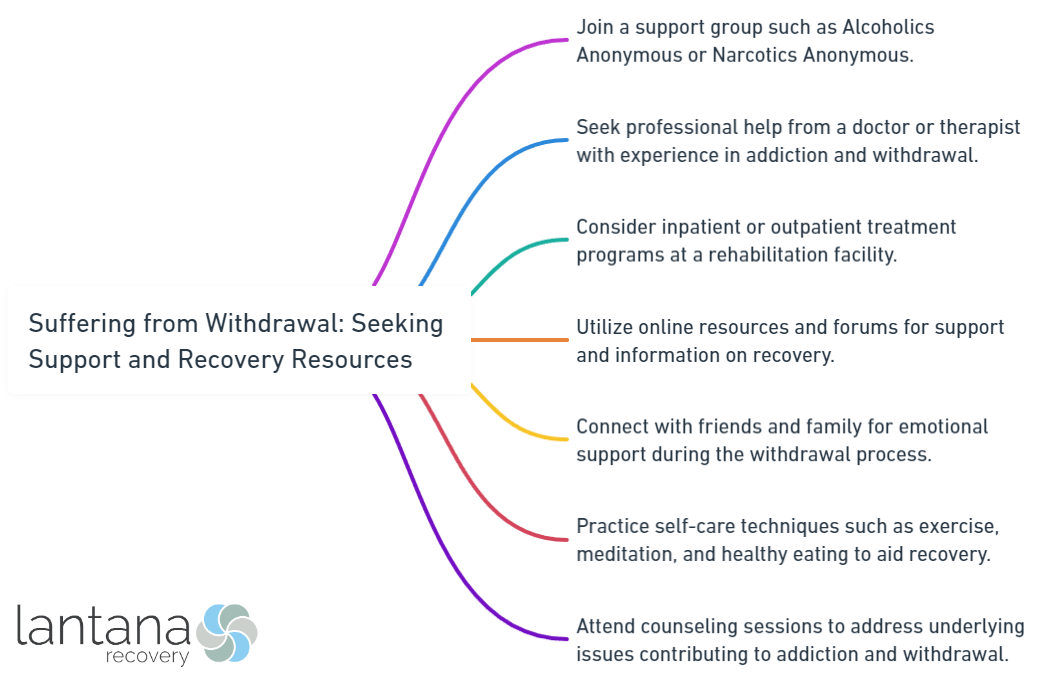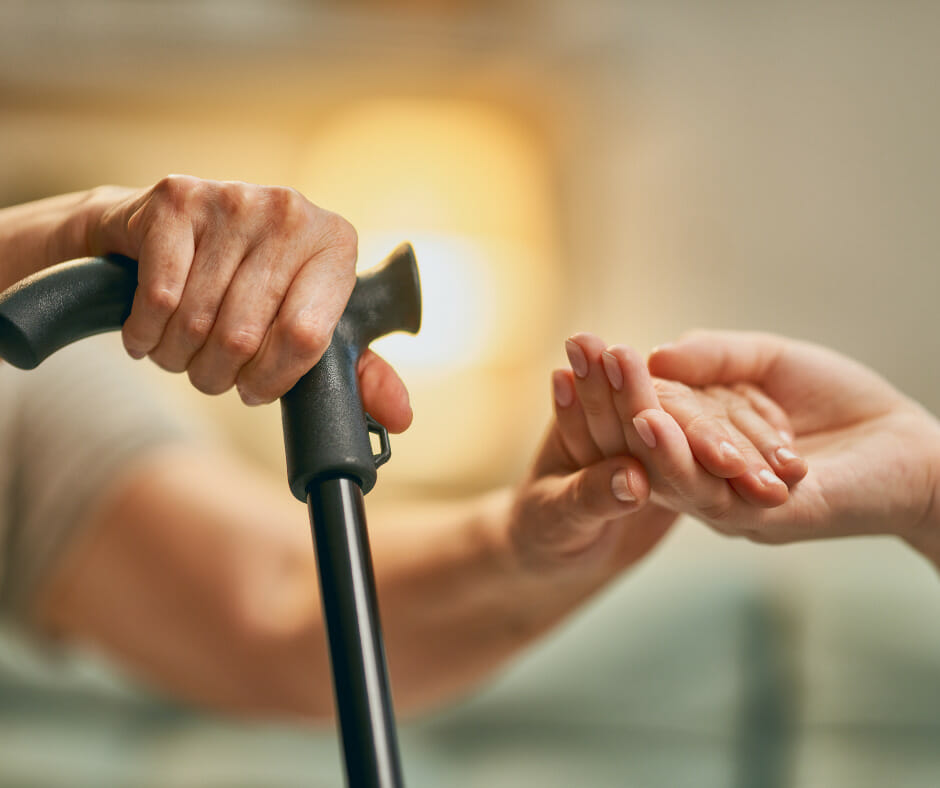Withdrawal can be a challenging and overwhelming experience, but seeking support and utilizing recovery resources can greatly aid in the process of overcoming it. To understand withdrawal, it is important to grasp its definition and different types.
Withdrawal refers to the physical and psychological symptoms that occur when an individual suddenly stops or reduces the use of a substance, such as drugs or alcohol. The specific symptoms experienced vary depending on the substance involved, and these symptoms can range from mild to severe.
Recognizing the signs and symptoms of withdrawal is crucial in order to effectively address and manage them. Common physical symptoms include headaches, nausea, sweating, tremors, and insomnia. On the other hand, common psychological symptoms may include anxiety, depression, irritability, and mood swings. Being aware of these symptoms can help individuals understand the challenges they may face during withdrawal and seek appropriate support.
When it comes to seeking support for withdrawal, there are various avenues to explore. Supportive friends and family play a vital role in providing emotional support and encouragement throughout the process. Medical and mental health professionals, such as doctors, therapists, and counselors, can offer guidance, monitor progress, and provide necessary medical interventions. Support groups and 12-step programs, such as Alcoholics Anonymous (AA) or Narcotics Anonymous (NA), can provide a sense of community and understanding, as well as provide valuable tools and strategies for coping with withdrawal.
Furthermore, recovery resources are available to assist individuals in their journey towards overcoming withdrawal and achieving long-term sobriety. Detoxification programs offer medical supervision and assistance in managing withdrawal symptoms during the initial stages of recovery. Inpatient rehabilitation centers provide comprehensive treatment and support in a residential setting. Outpatient treatment facilities offer flexible programs that allow individuals to receive treatment while still maintaining their daily responsibilities. Aftercare and relapse prevention programs provide ongoing support and guidance to prevent relapse and promote sustained recovery.

Understanding Withdrawal
Withdrawal is a natural process that occurs when an individual abruptly stops using a substance they are dependent on. It is commonly experienced by those who are addicted to drugs or alcohol. During withdrawal, both the body and mind go through a period of adjustment as they learn to function without the substance. This adjustment can result in uncomfortable and sometimes dangerous symptoms.
To better understand withdrawal, consider the following key points:
- Duration: The duration of withdrawal can vary depending on the specific substance and the individual. Typically, symptoms begin within a few hours to a few days after discontinuing substance use and can last anywhere from a few days to a few weeks.
- Physical Symptoms: Withdrawal can manifest as physical symptoms such as sweating, nausea, tremors, and muscle aches. It’s important to note that these symptoms are temporary.
- Psychological Symptoms: Withdrawal often involves psychological symptoms such as anxiety, depression, irritability, and mood swings.
- Severity: The severity of withdrawal symptoms can vary greatly from person to person. While some individuals may experience mild symptoms, others may face more severe symptoms that necessitate medical intervention.
- Support: Seeking support from healthcare professionals, friends, and family is crucial for individuals going through withdrawal. Support can significantly enhance the recovery process and provide the necessary resources for a successful journey towards sobriety.
If you or someone you know is currently experiencing withdrawal symptoms, it is essential to seek professional help. Substance abuse treatment centers, support groups, and healthcare providers can all offer guidance, support, and resources to assist individuals in navigating the challenges of withdrawal and embarking on their path to recovery. Remember, taking the initiative to seek help is the first step towards a healthier and happier life.
What is Withdrawal?
Withdrawal is a natural process that occurs when a person stops using or reduces their intake of a substance they are dependent on. What is Withdrawal? The body and brain adjust during withdrawal as they try to regain balance without the substance. The severity and duration of withdrawal can vary based on factors such as the type of substance, duration and intensity of use, and individual factors.
Withdrawal can cause physical symptoms like sweating, nausea, tremors, headaches, muscle aches, and sleep disturbances. Psychological symptoms include anxiety, irritability, depression, and difficulty concentrating.
It is important for individuals experiencing withdrawal to seek support from friends, family, medical and mental health professionals, support groups, and 12-step programs. These resources can provide emotional assistance, help manage withdrawal symptoms, and offer guidance throughout the recovery process.
Recovery resources for withdrawal include detoxification programs for managing the physical aspect of withdrawal, inpatient rehabilitation centers forF comprehensive treatment, and outpatient treatment facilities for support during daily life. Aftercare and relapse prevention strategies are crucial for maintaining sobriety after the initial withdrawal period.
Understanding what withdrawal is and seeking support and recovery resources are essential steps in overcoming substance dependence.
Fact: According National Institute on Drug Abuse, the relapse rate for substance abuse range from 40-60%. This highlights the fact that relapse is quite common and it does not indicate that the treatment has failed.
Types of Withdrawal
- Alcohol Withdrawal: Occurs when heavy drinkers suddenly stop or reduce alcohol consumption. Symptoms of alcohol withdrawal may include tremors, insomnia, anxiety, and seizures.
- Opiate Withdrawal: Occurs when individuals dependent on opioids abruptly stop using them. Symptoms of opiate withdrawal may include muscle aches, nausea, vomiting, diarrhea, and intense cravings.
- Benzodiazepine Withdrawal: Occurs when individuals taking benzodiazepines like Xanax or Valium for a long time attempt to quit or reduce their dosage. Symptoms of benzodiazepine withdrawal may include insomnia, anxiety, irritability, and seizures.
- Stimulant Withdrawal: Occurs when individuals using stimulant drugs like cocaine or amphetamines cease their usage. Symptoms of stimulant withdrawal may include fatigue, depression, increased appetite, and difficulty concentrating.
- Nicotine Withdrawal: Occurs when individuals addicted to nicotine through smoking or vaping attempt to quit or reduce tobacco or nicotine intake. Symptoms of nicotine withdrawal may include irritability, anxiety, cravings, and difficulty concentrating.
Pro-tip: Seek medical advice and support when experiencing withdrawal symptoms. A healthcare professional can provide guidance and appropriate treatment options to help manage the symptoms and increase the chances of successful recovery.

Recognizing the Signs and Symptoms
Withdrawal can be a challenging experience, but recognizing its signs and symptoms is the first step towards finding support and recovery. In this section, we’ll dive into common physical and psychological symptoms associated with withdrawal. From physical discomfort to emotional fluctuations, understanding these indicators can help you navigate this journey towards healing. So, let’s uncover the telltale signs that may arise during withdrawal and shed light on the path towards finding the resources you need.
Common Physical Symptoms
During withdrawal, individuals may experience common physical symptoms such as nausea, vomiting, headaches, sweating, tremors or shaking, increased heart rate, muscle aches and pains, insomnia or other sleep disturbances, loss of appetite, abdominal pain or cramping, and diarrhea. It is important to recognize that the intensity of these symptoms can vary depending on the substance and the individual.
It is also crucial to remember that not everyone will experience all of these symptoms, and additional symptoms may occur. To help manage these symptoms, it is recommended to stay hydrated, eat nutritious meals, engage in gentle exercise like walking or yoga, and seek medical guidance and support for your safety and well-being during withdrawal.
Common Psychological Symptoms
Common psychological symptoms experienced during withdrawal include:
- Anxiety: Many individuals experiencing withdrawal may have heightened levels of anxiety. This can result in feelings of restlessness, uneasiness, and apprehension.
- Depression: Certain substance withdrawals can lead to feelings of sadness, hopelessness, and a lack of interest in activities. It is common to experience mood swings and changes in sleep patterns.
- Irritability: Irritability is a common psychological symptom of withdrawal. Individuals may become easily agitated or have difficulty controlling their emotions, leading to increased conflicts with others.
- Cravings: Strong cravings for the substance being withdrawn from are a typical psychological symptom. These cravings can be intense and may result in thoughts of relapse or a strong desire to seek out the substance.
- Difficulty concentrating: Withdrawal can impair cognitive function and make it challenging to focus or concentrate. This can impact daily tasks and responsibilities.
- Impulsivity: Some individuals may experience increased impulsivity during withdrawal. This can manifest as engaging in risky behaviors or making impulsive decisions without considering the consequences.

Seeking Support for Withdrawal
Experiencing withdrawal can be a challenging and isolating journey, but you don’t have to face it alone. In this guide, we’ll explore various avenues of support available to help you through withdrawal. From the unwavering love and understanding of supportive friends and family to the expertise and guidance of medical and mental health professionals, and the empowering community found within support groups and 12-Step programs, you’ll discover a range of resources to aid your recovery. Let’s dive in and explore the supportive network waiting to help you reclaim your life.
Supportive Friends and Family
Supportive friends and family are crucial during withdrawal. They offer understanding, encouragement, and a sense of belonging, which aid in overcoming withdrawal and maintaining sobriety.
- Emotional support: Supportive friends and family provide a safe space for expressing feelings. They listen without judgment and offer reassurance and empathy.
- Practical help: Supportive friends and family accompany individuals to support group meetings and appointments with healthcare professionals. They also create a sober and supportive environment at home by removing triggers.
- Positive influence: Non-substance abusing friends and family serve as role models. Their healthy habits and lifestyle choices inspire and motivate those in recovery.
- Encouraging healthy activities: Supportive friends and family actively participate and encourage involvement in exercise, hobbies, and social gatherings. These activities distract from cravings and reduce relapse.
Read this article to know more about mushroom withdrawal symptoms, how common it is, and how to seek help for it.
Medical and Mental Health Professionals
Medical and mental health professionals are crucial in providing support for individuals experiencing withdrawal. They play a vital role in offering medical and psychological assistance to help individuals through this challenging process.
During withdrawal, doctors and nurses take the responsibility of assessing the physical health of individuals. They closely monitor vital signs, manage any complications that may arise, and administer necessary medications to alleviate symptoms. It is highly important to consult with these medical professionals to ensure safety and overall well-being.
Another set of professionals, including psychiatrists, psychologists, and counselors, provide much-needed emotional support and therapeutic interventions. They assist individuals in navigating psychological symptoms such as anxiety, depression, and cravings. Moreover, these experts create individualized treatment plans for long-term recovery.
A collaborative effort between medical and mental health professionals is crucial for a holistic approach to withdrawal. By offering integrated treatment programs that address both physical and psychological aspects, they enhance overall well-being and increase the likelihood of successful recovery.
When seeking support for withdrawal, it is essential to consult with medical and mental health professionals who specialize in addiction medicine or behavioral health. These experts provide evidence-based care and guidance throughout the entire withdrawal process.
Support Groups and 12-Step Programs
Support Groups and 12-Step Programs are valuable resources for individuals in withdrawal. They provide a supportive environment where people can share their experiences. Here are some reasons why these Support Groups and 12-Step Programs are beneficial:
- Peer support: Being surrounded by others who are going through similar challenges offers camaraderie and understanding. It helps people realize they are not alone.
- Shared experiences: These Support Groups and 12-Step Programs offer a platform for individuals to share their stories and learn from each other’s experiences. Hearing how others have overcome their struggles can be inspiring and provide hope.
- Accountability: Participants in Support Groups and 12-Step Programs are encouraged to set goals, track progress, and share achievements. This accountability helps individuals stay motivated and committed to recovery, recommends a study published in Substance Abuse and Rehabilitation titled Benefits of peer support groups in the treatment of addiction.
- Coping strategies: Support Groups and 12-Step Programs provide strategies for managing cravings, stress, and triggers. Participants learn effective tools for managing withdrawal symptoms.
- Lifelong support: Many Support Groups and 12-Step Programs offer long-term support beyond the withdrawal phase, helping individuals maintain sobriety and prevent relapse.
Sarah struggled with alcohol addiction for years. She joined a Support Group and found a network of supportive individuals who understood her struggles. Sarah shared her experiences, received valuable advice, and formed friendships with others on the same journey. The group gave her the strength to stay sober, especially during challenging times. Today, Sarah continues to attend meetings and helps others going through withdrawal. The Support Group is an essential part of her recovery journey.

Recovery Resources for Withdrawal
Looking to overcome withdrawal and find support on your road to recovery? Look no further. In this section, we’ll explore a range of helpful resources for your journey towards healing. From detoxification programs to inpatient rehabilitation centers, outpatient treatment facilities, and aftercare options, we’ve got you covered with an array of solutions tailored to your needs. Let’s dive in and discover the path to a healthier, happier tomorrow.
Detoxification Programs
Detoxification programs are crucial for individuals going through withdrawal recovery. These programs provide essential support and resources to safely eliminate toxins from the body while effectively managing withdrawal symptoms. The following are key aspects of detoxification programs:
- These programs are supervised by medical professionals who closely monitor vital signs, handle complications, and prioritize safety.
- Gradual reduction of substance dependency may be facilitated through the use of medication, which helps minimize withdrawal symptoms.
- Various therapy modalities, including individual counseling, group therapy, and alternative therapies, are employed to address the psychological and emotional aspects of withdrawal.
- Education on addiction, coping strategies, and relapse prevention equips individuals with the necessary tools to achieve long-term recovery.
- After undergoing detox, individuals are then referred to inpatient rehabilitation centers, outpatient treatment facilities, or other appropriate levels of care.
When selecting a detoxification program, it is essential to consider factors such as success rate, accreditation, staff credentials, amenities, and aftercare support. Seeking guidance from medical professionals or addiction specialists is highly recommended to ensure the most suitable program is chosen for your unique situation.
Inpatient Rehabilitation Centers
John sought help at an inpatient rehabilitation center for substance abuse. He received personalized care from a team of professionals at these Inpatient Rehabilitation Centers. Through therapy, including individual counseling, group therapy, and family therapy, as well as support groups, he gained insights into his addictive patterns and developed healthy coping mechanisms.
The Inpatient Rehabilitation Centers offer crucial support for individuals in withdrawal, providing structured, supervised care and treatment for addiction. They have specialized detox programs to help individuals manage withdrawal safely and comfortably, which may include medication-assisted treatment. Inpatient Rehabilitation Centers also provide round-the-clock medical care and supervision through medical professionals who closely monitor progress, manage physical symptoms, and ensure safety.
These centers address the underlying causes of addiction, develop coping strategies, and enhance overall well-being through various forms of therapy. Additionally, individuals in these centers connect with peers on a similar journey, providing valuable peer support during withdrawal. Inpatient Rehabilitation Centers focus on planning for the transition back into daily life, offering aftercare resources and support to help individuals maintain sobriety and prevent relapse.
A study published in Psychiatric Quarterly volume examining the efficacy of inpatient treatment as compared to outpatient treatment programs reported that inpatient rehabs are more effective and have a higher chance of recovery than outpatient programs.
Inpatient Rehabilitation Centers played a vital role in John’s journey to recovery, providing necessary support for a healthier and happier life.
Outpatient Treatment Facilities
Outpatient treatment facilities are a valuable choice for individuals seeking support and recovery during withdrawal. These facilities offer structured programs that incorporate various services such as therapy sessions, counseling, and group meetings. The convenience of flexible scheduling allows individuals to continue their daily responsibilities, including work or school, while receiving the necessary support for withdrawal.
One key benefit of outpatient treatment facilities is the personalized treatment plans they create based on each individual’s specific needs and goals. Mental health professionals conduct thorough assessments to determine the most effective methods for addressing withdrawal challenges. This individualized approach ensures that the treatment provided is tailored to the unique circumstances of each person.
In addition to personalized care, these facilities also have a supportive network of addiction treatment specialists, including therapists, counselors, and medical staff. This network provides guidance, counseling, and support throughout the withdrawal process. With their expertise, individuals can feel confident that they are receiving the necessary support to navigate withdrawal successfully.
One important aspect of outpatient treatment facilities is their focus on relapse prevention. They equip individuals with essential skills and strategies to prevent relapse by offering education on coping mechanisms, stress management techniques, and healthy lifestyle practices. By providing these resources, the facilities support individuals in their long-term recovery journey.
Continuity of care is another significant advantage of outpatient treatment facilities. After completing the initial withdrawal phase, these facilities often offer aftercare programs that provide ongoing support and accountability. These programs assist individuals in transitioning back into their daily lives while maintaining their sobriety.
Aftercare and Relapse Prevention
Aftercare and Relapse Prevention is crucial for recovery from withdrawal. Here are steps for effective aftercare and relapse prevention:
- Develop a comprehensive aftercare plan: Work with medical and mental health professionals to create a personalized aftercare plan that includes strategies to maintain sobriety and address ongoing issues or challenges.
- Attend regular therapy sessions: Individual therapy sessions can provide ongoing support and guidance during the recovery process. Therapy can help identify triggers, develop coping skills, and address underlying issues related to withdrawal.
- Engage in support groups: Join support groups, such as 12-step programs or recovery-oriented groups, to share experiences, receive support, and learn from others who have gone through similar struggles.
- Maintain a healthy lifestyle: Adopting a healthy lifestyle contributes to relapse prevention. This includes regular exercise, enough sleep, and stress reduction techniques like mindfulness or meditation.
- Build a strong support network: Surround yourself with supportive friends and family who understand and respect your recovery journey. A strong support network provides encouragement, accountability, and a sense of belonging.
- Identify and avoid triggers: Recognize situations, people, or environments that may trigger cravings or temptations for substance use. Take proactive steps to avoid or reduce exposure to these triggers to minimize the risk of relapse.
- Regularly evaluate progress: Continuously assess your recovery progress and make necessary adjustments to your aftercare plan. Stay vigilant and seek help if signs of relapse or difficulty in maintaining sobriety arise.
Remember, aftercare and relapse prevention are ongoing processes that require dedication and commitment. By taking proactive steps and utilizing available resources, you can strengthen your recovery and reduce the risk of relapse.
Frequently Asked Questions
What are post-acute withdrawal symptoms (PAWS) and how can they be managed?
Post-acute withdrawal syndrome (PAWS) is a common occurrence during the early stages of recovery from alcohol or drug addiction. It involves more psychological and emotional symptoms compared to acute withdrawal. PAWS can include muscle aches, nausea, headache, increased heart rate, and psychological and emotional discomfort. To manage PAWS symptoms, you can practice self-care, engage in regular exercise, maintain a healthy diet, get enough sleep, seek support from a therapist or counselor, engage in stress-reducing activities, build a strong support network, avoid triggers, practice relaxation techniques, and consider attending support groups or 12-step meetings for additional support.
What options are available for home-based withdrawal?
Home-based withdrawal is an option for individuals who have mild to moderate withdrawal symptoms and have support from a family member or friend. Before withdrawal begins, it is important to speak to a health professional to ensure safety and receive post-withdrawal support. The support person should talk to the health professional supervising the withdrawal to understand their role and what they need to do to help. They should also familiarize themselves with the effects of the drug being used, the duration of withdrawal symptoms, and common withdrawal symptoms. Medically supervised detoxification can help ease withdrawal symptoms, and managing cravings and challenging illogical thoughts are important functions of a support person.
What should be considered when seeking a stable and safe place to live during withdrawal?
Having a stable and safe place to live is important during withdrawal. It is crucial to ensure that there are no drugs or alcohol in the house to avoid temptation. Support persons should discourage people who use drugs from visiting during withdrawal and be present during tough times. If possible, it is recommended to have a home environment that is supportive and free from triggers that may remind the person of substance use. Additionally, state and territory alcohol and drug information services (ADIS) can provide counseling, information, and referrals to services for support in finding a stable and safe place to live.
How can Hazelden Betty Ford Addiction Treatment Centers help individuals with mental and substance use conditions?
Hazelden Betty Ford Foundation offers help and hope for recovery from mental and substance use conditions. They provide a range of services, including clinical treatment, peer support, faith-based approaches, and self-care strategies. Their addiction treatment centers offer comprehensive and individualized care to address the specific needs of each person. The centers focus on building resilience, improving health and wellness, and helping individuals reach their full potential. Hazelden Betty Ford Foundation can be a valuable resource for individuals seeking support and recovery from mental and substance use conditions.
What support is available through the Office of Recovery?
The Office of Recovery, established to evaluate and initiate recovery-focused policies, programs, and services, serves as a national clearinghouse and resource for recovery-oriented care. They represent the voices of individuals in recovery and support the growth and expansion of recovery support services nationwide. The office aims to promote cultural awareness and competency in recovery support systems, partnering with individuals and their families to guide the behavioral health system. They provide various services aimed at facilitating recovery and wellness, including social, legal, and other supportive services to help individuals live full lives in their chosen communities.
How can I access evidence-based treatment for substance use disorders and overdose?
The National Institute on Drug Abuse (NIDA) funds research aimed at increasing access to evidence-based treatment for specific populations, such as adolescents, people in justice settings, and those with other mental health concerns. They support the development of effective interventions for treating substance use disorders and overdose, including medications like wellbutrin for stimulant withdrawal, behavioral interventions, and digital therapeutics. NIDA provides valuable resources for accessing substance use and mental health treatment, including information from the Substance Abuse and Mental Health Services Administration, MedlinePlus, the Helping to End Addiction Long-term® Initiative, and the National Institute on Alcohol Abuse and Alcoholism. These resources can help individuals find the support and treatment strategies they need for recovery.









